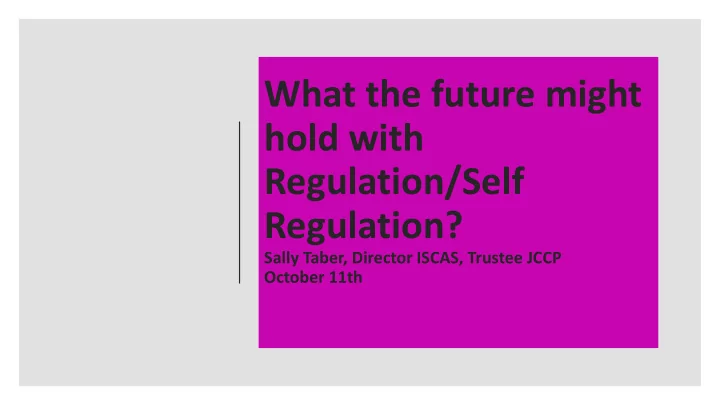

What the future might hold with Regulation/Self Regulation? Sally Taber, Director ISCAS, Trustee JCCP October 11th
Cosmetic Surgery framework – To include the RCS Certification Scheme to provide evidence of competencies Tn 20Th16, new guidance set sttHandards of good practice for doctors who offer cosmetic interventions. t The Royal College of Surgeons of England (RCS) also developed a certification scheme to provide evidence of competences in defined areas of cosmetic surgery. The RCS asked ISCAS to help it understand whether the new standards were having an impact in respect of complaints about cosmetic surgery.
Cosmetic Surgery Survey performed - Travel Abroad • The number one most cited reason for choosing to travel abroad for surgery was cost with 85% of respondents cited. The most popular destination was Turkey, claiming a quarter (25%) of cases; followed by Belgium (15%) and many others such as France, Cyprus, Tunisia and Colombia. Interestingly, when examined, many patients would simply have been ruled out in the UK, due to key medical history, for example smoking and weight (BMI), and possibly psychological issues as well. Surgeons ascribe this specific phenomenon, in part, as a possible result of aggressive marketing campaigns, particularly targeting vulnerable people through social media, as well as celebrities unashamedly pursuing the curviest of curves on their Instagram feeds, such as the likes of Kim Kardashian.
Joint Council of Cosmetic Practitioners (JCCP) chaired by Professor David Sines OBE Cosmetic practice Standards Authority (CPSA) chaired by Mr Simon Withey, Baaps
The background to JCCP and CPSA • Unregulated sector which did not take advantage of self regulation • In practice • In education & training • JCCP mission • Patient safety • Improve standards across the sector with standards on 5 modalities set by the CPSA – Botulinums, Dermal Filers, Lasers and Lights, Chemical Peels and Hair Restoration
How can practitioners decide?
Difficult for practitioners to differentiate COURSE Pathway into Aesthetics COURSE OVERVIEW Our pioneering Pathway into Aesthetics Course has been created especially for non medics, to furnish non-medics with an educated entrance into the world of aesthetics. This course Includes two vital elements: 1) Anatomy & Physiology level 4 with Pathology - This is a CPD accredited course, whereby you will gain 150 points which you can use against University point acceptance.
The JCCP ‘Registers’ ‘JCCP Approved qualification JCCP Registered & education providers register Practitioners What do we know so far…… • The registers are voluntary • Underpinned by clear set of entry requirements • There is a fee to join and to remain on the register • Insurance subject to being on the register….
The Practitioner Register Professional Statutory No Professional Body Body Registrants Registrants JCCP Registered Practitioners Therapist Doctor Tattooist Nurse ……… Dentist
Routes to remain on the JCCP ‘practitioner’ register Undertake JCCP approved course Learning & assessment of knowledge and competence Undertake JCCP approved course with RPL Register Learning, assessment of knowledge and competence with some recognition of prior learning No qualification awarded Fast track Assessment of equivalent level of knowledge & Assessment of knowledge & competence only via a competence to enter the JCCP approved assessment centre register
The JCCP Approved Education Providers Register ‘JCCP Approved’ education, & qualification providers register Education programmes leading to qualifications
JCCP Strategic Partnerships & their importance The JCCP now has partnership agreements and Memorandum of Understanding with the following key bodies: For practice • Clinical Practice Standards Authority (Who define the practice standards & code of practice – how practitioners should act) • GMC (other Professional Statutory Regulated Bodies (RSRB) in consultation phase – NMC, GDC, HCPC, G PhC and PSNI) so that registrants on a PSRB register can be managed when fitness to practise is questioned For education • Qualification regulator (England- Ofqual) • Other UK qualification regulators – SQA ( in discussion) • ASA – Advertising Standards Authority (agreed) • Awarding Organisations (In process )
Entry criteria based upon academic progression principles PSRB standards-define knowledge & competence of regulated practitioners at the point of registration. Anything beyond- specialist or advanced practice, requires further learning /qualifications/assessment of competence. PG Cert, PG Dip Ad Dip, Grad Cert Beauty Nurse Physio Dentist Doctor Therapist L4 or 5 or 6 L5 or 6 L6 L6 L2 or 3
Teachers/Tutors (those who develop and/or deliver the course content) • Must be competent • Subject specific knowledge at the required academic level for the award • Knowledgeable & competent to teach at that level • To teach level 4/5 programmes • Level 4 Certificate in Education and Training (CET) • Level 5 Diploma in Education and Training (DET) or Post Compulsory Education & training (PCET) • Level 4 Award in Preparing to Teach in the Lifelong Sector (PTLLS) • Level 4 Certificate of Teaching in the Lifelong Learning Sector (CTLLS) • Level 5 Diploma of Teaching in the Lifelong Learning Sector (DTLLS) • To teach level 6/7 programmes • They should have appropriate subject specific knowledge themselves or within the team • The main teacher should be at least at graduate level themselves and have a recognised teaching qualification for delivering programmes of study at undergraduate/ post graduate level. • PGCE (Post Graduate Certificate in Education) OR • Achievement of the UK Professional Standards Framework for teaching and supporting learning (UKPSF level D2 (Fellow) or above) • Academic professional – apprenticeship route L7 • See standards document for other equivalent qualifications
Regulatory Requirements for Complaints Management • Care Quality Commission • Healthcare Improvement Scotland (HIS) • Healthcare Inspectorate Wales (HIW) • Regulation and Quality Improvement Authority (RQIA) www.iscas.org.uk
Recommend
More recommend